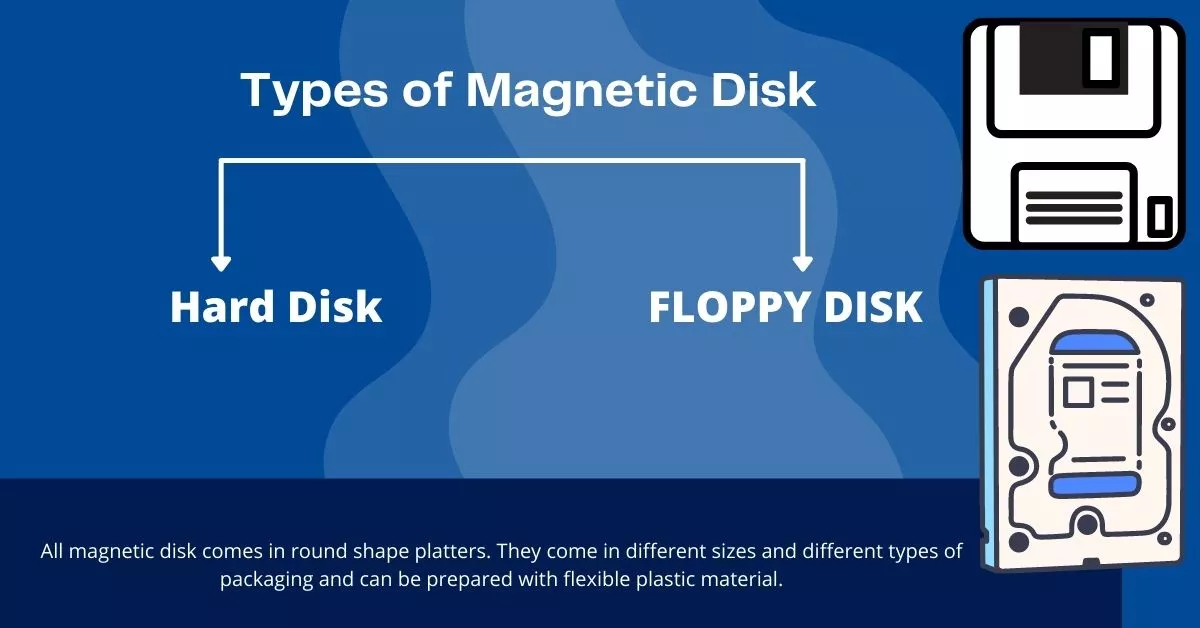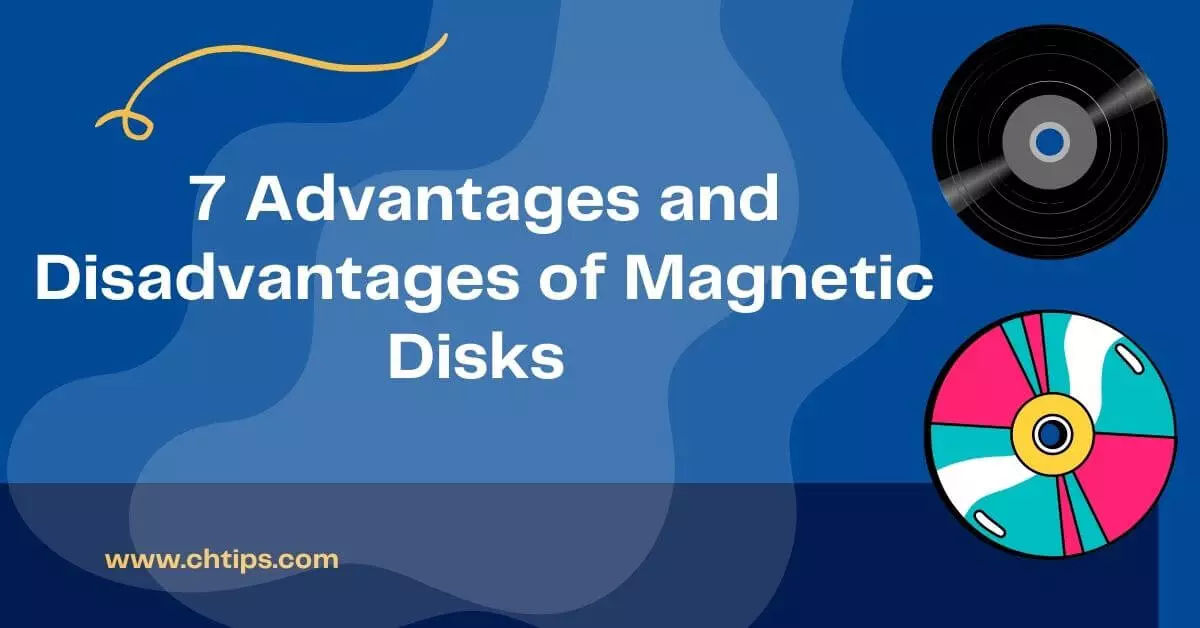In this article, we are going to discuss and learn what is magnetic disk? with 7 advantages and disadvantages of magnetic disks.
Before going further I would like to urge you to please follow my previously written articles on basic and advanced computer tutorials.
So let’s get started.
What is Magnetic Disk?
The magnetic disk is also called secondary storage device the primary examples of magnetic disks are hard disks, floppy disks, etc.
The magnetic disk is non-volatile in nature they do not tend to lose data or information when there is no power supply likewise RAM (Random Access Memory) can lose data when there is no power supply given to the computer system.
The information in the magnetic tapes is accessed with the help of multiple heads.
Magnetic storage devices use different patterns of magnetization in a magnetizable material to store data
The data or information stored in this magnetic device is stored almost permanently
Before some years magnetic disk or magnetic storage was the primary storage device that was capable of storing huge amounts of data/information.
But nowadays SSD (Solid State Drives) are easily replacing them because of their data exchange speed, huge data storage capacity, and low cost.
Types of Magnetic Disk

All magnetic disk comes in round shape platters. They come in different sizes and different types of packaging and can be prepared with flexible plastic material.
Based on these certain differences there are many different types of magnetic disks available in the market.
Today this magnetic disk can be divided and classified into two types
- FLOPPY DISK
- HARD DISK
Floppy disks are packaged in plastic cases whereas hard disk is packaged in cartridges or container
Depending on the type of packing hard disks are further divided into ZIP disks, disk packs, and Winchester disks.
Related Articles
- Advantages and Disadvantages of CRT Monitors
- Advantages and Disadvantages of Optical Disk
- Advantages and Disadvantages of Microprocessor
- 20 Advantages and Disadvantages of Mobile Phones
- Advantages and Disadvantages of LCD Monitors
- 10 Advantages and Disadvantages of CCTV Cameras
- What are the Hard Copy Output Devices
- Computer Basic Tutorials
History of Magnetic Disk
Magnetic Storage in the form of wire recording was first launched by Oberlin Smith in year 1888 on Sept 8.
In the olden days, computers used magnetic storage as primary storage in the form of magnetic drums, core memory, cache memory, and thin-film memory, whereas modern computers use magnetic tapes in the form of secondary memory.
Magnetic disks are circular in shape with platters that resemble CDs and DVDs. The size of the platters is from 1.8 to 5.25 inches and the platter is further divided into tracks and sectors.
Both sides of the platters are manufactured with magnetic material so that the data can be stored on them.
Merits and Advantages of Magnetic Disk
Below I have mentioned some of the advantages of magnetic disks
- The speed to process data and information is enormous therefore these magnetic disk works very fast and hence they save our precious time.
- The data stored in these devices are stored almost permanently.
- They are considered to be the best secondary storage devices as they are cheaper and lighter in weight.
- Magnetic disks support direct access to data and therefore they are more suitable for a wide range of applications.
- Magnetic disk possesses random access property, therefore, they are used in shared project and applications where multiple users can use a project simultaneously.
- Magnetic disks are suitable for both offline and online storage of data. The Zip drives and floppy disks are used in offline secondary storage devices.
- High-end Winchester disks are used in personal computers where users enjoy the use of software and applications.
- The size or capacity to store huge amounts of data made them so popular these days.
- Their cost is very low and the density to store the volume of data is huge as well as one can store and delete data whenever required.
- They are very light in weight and can store huge data in less space.
- Due to their lightweight and compact size, they can be easily transferred from one location to another. They are also used in copying data from one computer to another.
- These magnetic disks are not vulnerable to temperature and humidity, therefore, the chances of data damage and corruption are way less as compared to other alternatives.
Drawbacks and Disadvantages of Magnetic Disk
- They must be stored in a dust-free environment
- The data /information can be erased unintentionally due to easy access.
- Magnetic disks are costlier than magnetic tapes
- Winchester disk a type of magnetic disk is not as portable as magnetic tapes.
- The security features on magnetic disks cannot be easily maintained as they are on distributed and shared networks.
Related Articles
- Top 10 Advantages and Disadvantages of Computer
- Main Characteristics of Computer System
- Differences Between HTTP and SMTP
- Advantages and Disadvantages of Hard Disk Drives
- Advantages and Disadvantages of CDs and DVDs
- Advantages and Disadvantages of Wifi
- 10 Advantages and Disadvantages of HTTPS
Frequently Asked Questions [FAQs]
What are the Advantages and Disadvantages of Magnetic Tape?
Magnetic tape can be reused repeatedly.
Huge amounts of information are stored.
If the data is stored near a strong magnetic field the tape can be damaged.
Magnetic tape has a lifespan of 15 years.
Data quality gradually gets damaged over time.
It is necessary to keep older tape equipment just to be able to read the stored data.
Magnetic tape is inexpensive and budget friendly.
What are the Advantages and Disadvantages of Hard Disks?
Advantages of hard disk
Cost
Storage capacity
Availability
Lifespan
Non-Volatile
Disadvantages of hard disk
Speed
Form Factor
Power Consumption
Noise
Conclusion
In the above article, we have discussed on 7 advantages and disadvantages of magnetic disks with its merits and drawbacks.
If you liked the article please comment, like, and share this on social networks with your friends, family, and colleagues.
I would like to hear from you, all suggestions are open-heartedly welcome.
"Thank You For Reading"
